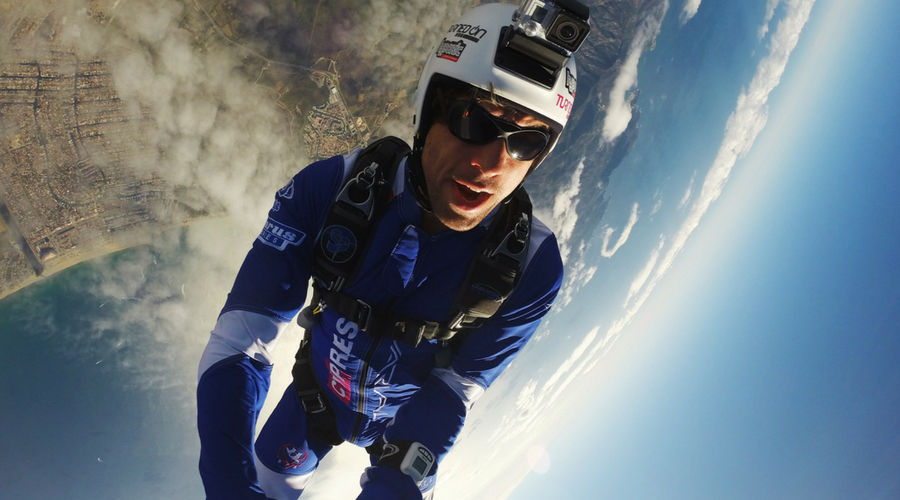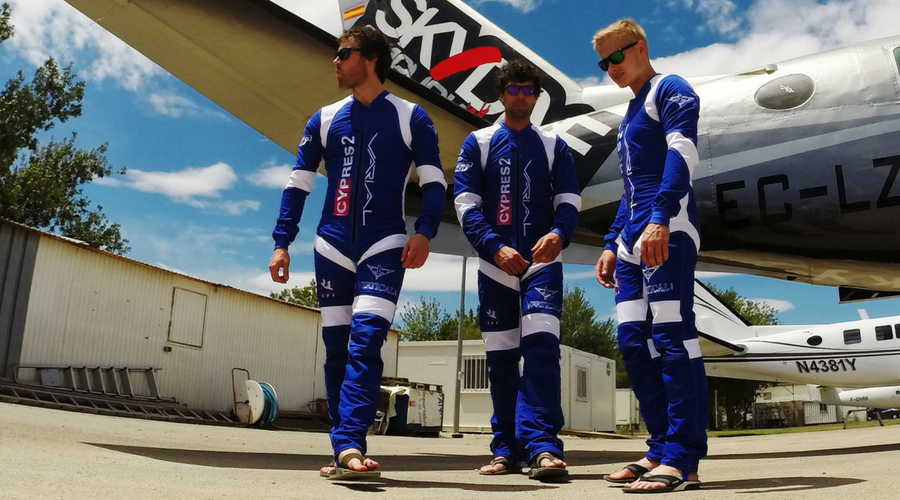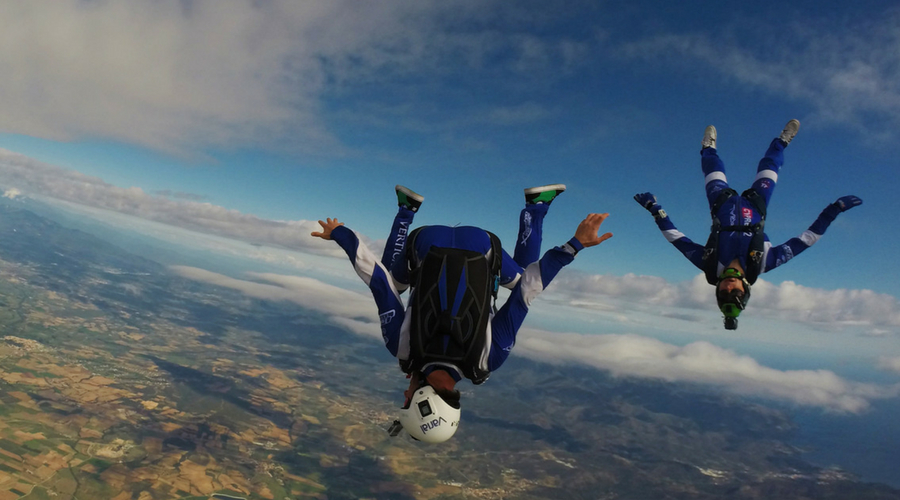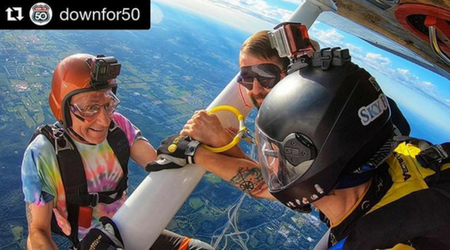
CYPRES Athlete Joel Strickland Talks About Intentionality
Monday, October 29, 2018
- Team CYPRES
- 10/29/18
- 0
- General, Sponsored Athlete
Gotta Represent
Joel Strickland earned his skydiving license in Australia in 2005, then moved to New Zealand to start jumping in earnest. After living in New Zealand for several years, he returned to the UK and began a career as a tunnel instructor. He set about working his way through the ratings to the level of instructor trainer, using what little vacation he had to travel for big-wall BASE jumps and BASE events in mainland Europe. In 2010, Joel teamed up with two other ambitious instructors, Steve Howes and Ted Foster, to compete professionally–outdoors, in the artistic disciplines; indoors, in the newly emerging dynamic flying format. They called themselves Varial Freefly.

Competition, as Joel and his team soon discovered, is a cruel and beautiful mistress. Joel’s meager vacation time quickly dissolved. So did any discretionary income he was able to scrape together from the tunnel gig.
“It’s a massive effort that you have to put in when you’re getting a freefly team going,” Joel notes.
“There’s a huge leap from doing fifty jumps with your mates for funsies and entering the Nationals; to trying to get enough training and enough jumps to be good enough to represent your country and play the game on the world level.”
Outside support was a must
It would be four years before the team was able to secure any funding from the British Parachute Association, and all three athletes were full-time tunnel instructors. Outside support was a must. As they trained, the team diligently reached out. First, a suit sponsorship came in from Deepseed. Skydive Dunkeswell kicked in an attractive team rate, then Skydive Spain, where the training weather was more consistent. Ted left the team in 2012, replaced by Pete Brookes. Then Adam Dare took a turn in 2014; Steve and Joel soldiered on.

Predictably, it was when the team turned its first good results in its native UK in 2012 that things started to heat up. With the fifty jumps they were able to scrape together, they made it to a tiebreak jump for a National silver medal in freefly. Heads started to turn. The first tentative international gear sponsorships started to trickle in.
“In the beginning, when you’re untested, you don’t get a lot of help,” Joel muses. “That makes any support you can get from anywhere very important. Every little bit counts. Those companies that take a chance on new-but-promising teams–teams that really demonstrate a commitment to the total package of effort involved in getting to the top level–really capture athlete loyalty.”
CYPRES joined in 2013
Throughout the whole process of creating and developing Varial’s profile as a team and as individual athletes, the trio of competitors worked very hard on building relationships with the manufacturers that were their first choices. When CYPRES joined Varial’s manufacturer support team in 2013, Joel and his teammates were overjoyed.
“From the start, it has been vitally important to me that I represent my first-choice manufacturers,” he says, “And it was especially important in this case. I would never trust another AAD than CYPRES.
Sponsoring is a two-way relationship
Plus, coming into a sponsor relationship with strong positive feelings helps with the two-way relationship that acting as a sponsored athlete requires. You have to be willing to start conversations about the product with perfect strangers and share images and video of you using it, and that’s easy when you actually do love the product.”
Varial ended up competing at the Mondial in 2016. The team took 8th place–a strong showing for a self-funded team in a category replete with government-backed contenders. After six years (and no less than three national gold medals), Joel was ready to hand his slot on Varial over to a hungry new team member. He passed the baton to Matty Mitchell, picked up his AFF rating and started traveling in earnest.

Last year, Joel had the unique opportunity to see the very birthplace of his CYPRES unit. En route from Slovakia to his English home, he made an intentional detour to see the CYPRES offices and meet the faces behind the several years’ worth of Airtec emails in his archives.
Putting names to faces helps to establish trust
“I jumped at the chance to see the factory,” he grins. “First off, it’s incredibly interesting to see how the units are assembled and tested. It really puts into perspective the amount of effort, man hours and precision that go into every single one of them.
We all know that CYPRES has an amazing history in the sport, but to see all the old units displayed there and hear the stories from Helmut himself–well, that’s a pretty special way to experience that legacy.”
“Secondly, I could not recommend highly enough: If you’re operating as a sponsored athlete, make the effort to meet the people behind the gear you champion,” he continues “And put names to faces. Entering into a sponsorship is a kind of promise, and showing up personally helps to establish the trust you need to make it work for everyone.”
What’s next?

These days, Joel is a freelance journalist, organizer and tunnel coach (operating predominantly from the Hurricane Factory tunnel in Slovakia). He trained as an FAI judge and has served on the panel at multiple world level events. Pursuing projects outside of the competition scene has taken Joel to many exotic skydiving destinations around the world. For fun and for work. And exciting plans are still on the go: This summer, he’s part of a two-person team completing the first 50-state sport skydiving circuit ever to be attempted in a single unbroken journey. After that’s complete, he has agreed to join Hurricane Factory Berlin as Sport Manager. According to Joel, tackling bigger and better projects is all a part of the greater “bootstrap” philosophy that earned him and Varial its medals.
“The creation and development of the CYPRES unit is inseparable from the evolution of skydiving itself. A device born of passion and necessity that has saved many lives across several decades. I am immensely proud to be a part of the team and to represent them as an athlete as I go about the place.”
Tags: Freefly, Joel Strickland, Tunnel, Varial Freefly
Adventure, Tips, and Adrenaline
Subscribe to Our Newsletter
By signing up for our newsletter you declare to agree with our privacy policy.

